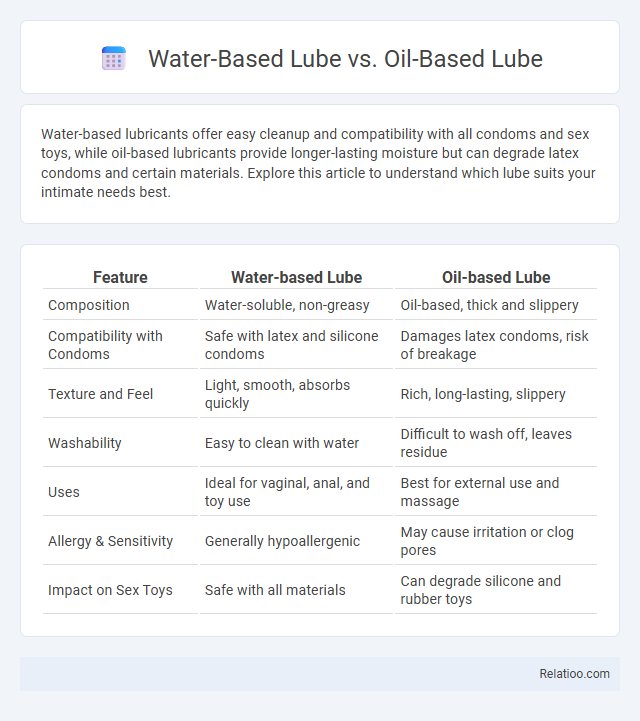Water-based lubricants offer easy cleanup and compatibility with all condoms and sex toys, while oil-based lubricants provide longer-lasting moisture but can degrade latex condoms and certain materials. Explore this article to understand which lube suits your intimate needs best.
Table of Comparison
| Feature | Water-based Lube | Oil-based Lube |
|---|---|---|
| Composition | Water-soluble, non-greasy | Oil-based, thick and slippery |
| Compatibility with Condoms | Safe with latex and silicone condoms | Damages latex condoms, risk of breakage |
| Texture and Feel | Light, smooth, absorbs quickly | Rich, long-lasting, slippery |
| Washability | Easy to clean with water | Difficult to wash off, leaves residue |
| Uses | Ideal for vaginal, anal, and toy use | Best for external use and massage |
| Allergy & Sensitivity | Generally hypoallergenic | May cause irritation or clog pores |
| Impact on Sex Toys | Safe with all materials | Can degrade silicone and rubber toys |
Introduction to Personal Lubricants
Water-based lubricants offer versatile compatibility with condoms and sex toys, making them ideal for safe sex practices. Oil-based lubricants provide long-lasting moisture but can degrade latex condoms, increasing the risk of breakage and reducing protection during intercourse. Choosing the right personal lubricant enhances comfort and safety, supporting a pleasurable and secure sexual experience.
What Is Water-Based Lube?
Water-based lube is a versatile, non-greasy lubricant made primarily from water and soluble ingredients, making it compatible with latex condoms and most sex toys. It provides a natural feel and easy cleanup without leaving stains or residue, ideal for individuals with sensitive skin or allergies. Unlike oil-based lubes, which can degrade latex and cause irritation, water-based formulas support safer sex by reducing friction and minimizing the risk of condom breakage.
What Is Oil-Based Lube?
Oil-based lube is a lubricant made from natural oils or synthetic oil compounds, offering long-lasting moisture and smoothness. Unlike water-based lube, it is not compatible with latex condoms, increasing the risk of condom breakage and reducing the effectiveness of safe sex practices. Your choice should consider these factors to ensure protection and comfort during intimate activities.
Key Differences Between Water-Based and Oil-Based Lubes
Water-based lube offers easy cleanup, compatibility with latex condoms, and a natural feel, making it ideal for safe sex practices, while oil-based lube can degrade latex and increase the risk of condom failure. Your choice impacts protection effectiveness, with water-based lubes reducing the risk of sexually transmitted infections compared to oil-based options. Understanding these key differences ensures optimal safety and comfort during intimate moments.
Pros and Cons of Water-Based Lube
Water-based lube offers excellent compatibility with most condoms and sex toys, making it a safe choice for enhancing intimacy without damaging latex or silicone materials. It absorbs quickly and can dry out faster than oil-based alternatives, requiring reapplication during longer sessions. Your choice of water-based lube ensures easy cleanup and reduces the risk of staining, but it may lack the long-lasting slickness provided by oil-based lubricants.
Pros and Cons of Oil-Based Lube
Oil-based lube offers long-lasting lubrication and is ideal for activities requiring extended moisture, but it can degrade latex condoms, increasing the risk of breakage and compromise safety during sex. It is also more difficult to clean and may stain fabrics, making it less convenient for some users. Your choice should carefully consider compatibility with condoms and ease of cleanup to maintain safe and enjoyable sexual experiences.
Suitability for Condoms and Sex Toys
Water-based lube is ideal for use with condoms and sex toys, as it is non-reactive and easy to clean, preventing material degradation. Oil-based lube, while longer-lasting, can weaken latex condoms and cause damage to silicone-based toys, making it unsuitable for these purposes. For safe sex practices, water-based lubricants provide the best compatibility and safety with condoms and most sex toy materials.
Safety, Sensitivity, and Allergies
Water-based lube offers excellent safety for sensitive skin and is hypoallergenic, making it ideal for you if allergies are a concern. Oil-based lube, while long-lasting and natural-feeling, can degrade latex condoms, compromising safe sex practices and increasing the risk of infections. Prioritize sensitivity by choosing water-based lubes for condom compatibility and easy cleanup, especially if you have sensitive skin or allergy concerns.
Cleaning Up: Water vs. Oil-Based Lube
Water-based lube offers quick and easy cleanup with just soap and water, making it ideal for maintaining hygiene and preventing residue buildup on your skin and fabrics. Oil-based lubes, while longer lasting, require oils or special cleaners for thorough removal and can stain sheets or clothing, increasing the risk of bacterial growth if not cleaned properly. Your choice of lubricant impacts not only comfort but also the ease of maintaining a clean, safe environment for intimate activities.
Choosing the Best Lube for Your Needs
Water-based lube offers easy cleanup and compatibility with all condoms and sex toys, making it ideal for safe sex and versatile use. Oil-based lube provides longer-lasting lubrication but can degrade latex condoms, increasing the risk of breakage and reducing safety during sex. Selecting the best lube depends on factors such as condom use, skin sensitivity, and the type of sexual activity to ensure both comfort and effective protection.

Infographic: Water-based Lube vs Oil-based Lube
 relatioo.com
relatioo.com